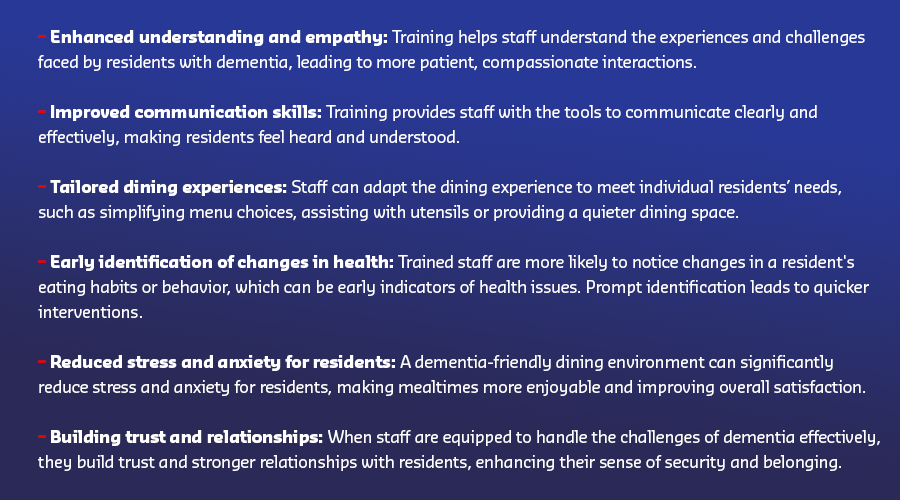In senior living communities, the dining experience is a cornerstone of daily life, offering not just nourishment but also opportunities for social interaction and engagement. Our most meaningful connections are often shared through a meal. Food, after all, unites us, regardless of our age.
For residents with dementia, however, the dining room can present a range of challenges, as frontline dining staff in dementia care communities know. These residents may struggle with menu choices, using utensils or managing the sensory overload of a busy dining room. Recognizing and addressing these challenges is crucial for their well-being.
There are many ways to improve the experience of these residents, starting with implementing specialized dementia training for frontline dining staff. Often the most frequent point of contact for residents, their role goes far beyond simply serving food. They are integral in creating a welcoming and supportive dining environment, and with proper training, these staff members can become adept at recognizing and accommodating the unique needs of residents with dementia. They might even be the first to recognize early signs and symptoms and can address them early and appropriately.
“Some states have regulations that staff have to have a certain amount of dementia training in order to even work in a skilled nursing facility,” says Mindi Manuel, Senior Area Clinical Support Manager for Sodexo. “At Sodexo, we make sure that all of our staff are trained so they understand how a dementia patient or resident may act and what sensory deficits may make it difficult for them to order their meal or look at a menu or just stay in the dining room. The staff are trained in addressing these behaviors, whether it’s redirecting a resident, making sure that they’re speaking loud enough because the resident may have a hearing deficit, or helping them with their menu choices because they may have a vision deficit. We train them on not just understanding the disease, but also how to interact with the residents.”
An integrated dining solution, staffed with a care team of dining and clinical staff — including dietitians who not only create menus proven to support brain health but consider everything in the residents’ environment, including noise level, table arrangement, and silverware and plate placement — offers a holistic, best practices approach that benefits residents across all levels of care. Other crucial benefits of dementia training for frontline dining staff include:

View the accessible version
By equipping frontline and clinical staff with the knowledge and skills to meet the unique needs of these residents, senior living communities can enhance the dining experience, fostering greater satisfaction and a sense of belonging among all residents.
For more information on optimizing your frontline dining staff as they care for dementia residents, contact us.
